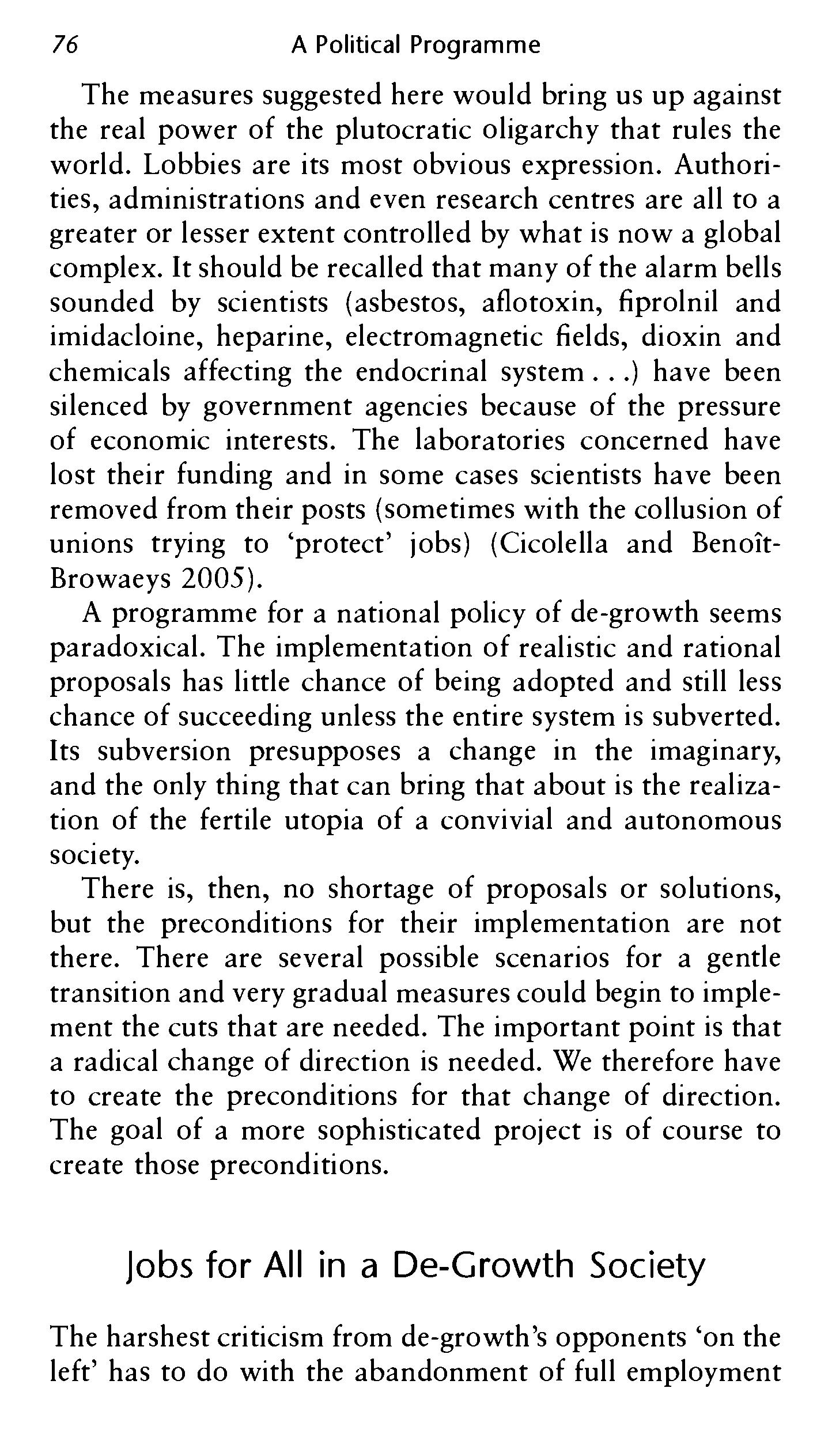
33 minute read
Jobs for All in a Dc-Growth Society
76 A Political Programme
The measures suggested here would bring us up against the real power of the plutocratic oligarchy that rules the world. Lobbies are its most obvious expression. Authori- ties, administrations and even research centres are all to a greater or lesser extent controlled by what is now a global complex. It should be recalled that many of the alarm bells sounded by scientists (asbestos, aflotoxin, fiprolnil and imidacloine, heparine, electromagnetic fields, dioxin and chemicals affecting the endocrinal system. . .) have been silenced by government agencies because of the pressure of economic interests. The laboratories concerned have lost their funding and in some cases scientists have been removed from their posts (sometimes with the collusion of unions trying to 'protect' jobs) (Cicolella and Benoît- Browaeys 2005).
A programme for a national policy of de-growth seems paradoxical. The implementation of realistic and rational proposals has little chance of being adopted and still less chance of succeeding unless the entire system is subverted. Its subversion presupposes a change in the imaginary, and the only thing that can bring that about is the realiza- tion of the fertile utopia of a convivial and autonomous society.
There is, then, no shortage of proposals or Solutions, but the preconditions for their implementation are not there. There are several possible scenarios for a gentle transition and very gradual measures could begin to imple- ment the cuts that are needed. The important point is that a radical change of direction is needed. We therefore have to create the preconditions for that change of direction. The goal of a more sophisticated project is of course to create those preconditions.
Jobs for All in a De-Growth Society
The harshest criticism from de-growth's opponents 'on the left' has to do with the abandonment of full employment
implicit in our project.9 When we are asked to be 'realistic' in this context, what solutions do those who object to continued growth - they have been described as the 'kids of the rich' by a journalist on Le Monde - have to offer to the problem of unemployment?'0
They argue that using consumption, and therefore growth, to relaunch the economy has to be ruled out. A sharp reduction in the number of hours we have to work is therefore a necessary precondition for getting away from the work-based model for growth, but also for ensur- ing that everyone has a satisfying job; that will bring about the two-thirds reduction in the consumption of natural resources that is required in France. Hence the apparent discrepancy, in terms of realism and time-scale, between our proposals and those of the 'relaunchers': we will not immediately ban the heavy goods vehicles that transport consumer goods we do not need (as well as most of those we do need) or cut the number of cars on the road
or planes in the air. It will take time to relocalize produc- tion, trade and ways of life. That is a challenge because we urgently need a political ecology, even if it means upsetting the political ant's nest. This is not a long-term issue. We must start today, think in terms of stages and not lose sight of our goal. And besides, and whatever our detractors may think, ecological politics is not incompat- ible with social policy. Indeed, it is a precondition for any change that does not just plaster over the cracks. 'We cannot solve the environmental crisis without solving social problems,' Murray Bookchin said in 1990. That may well be true, but the converse may be even truer: we
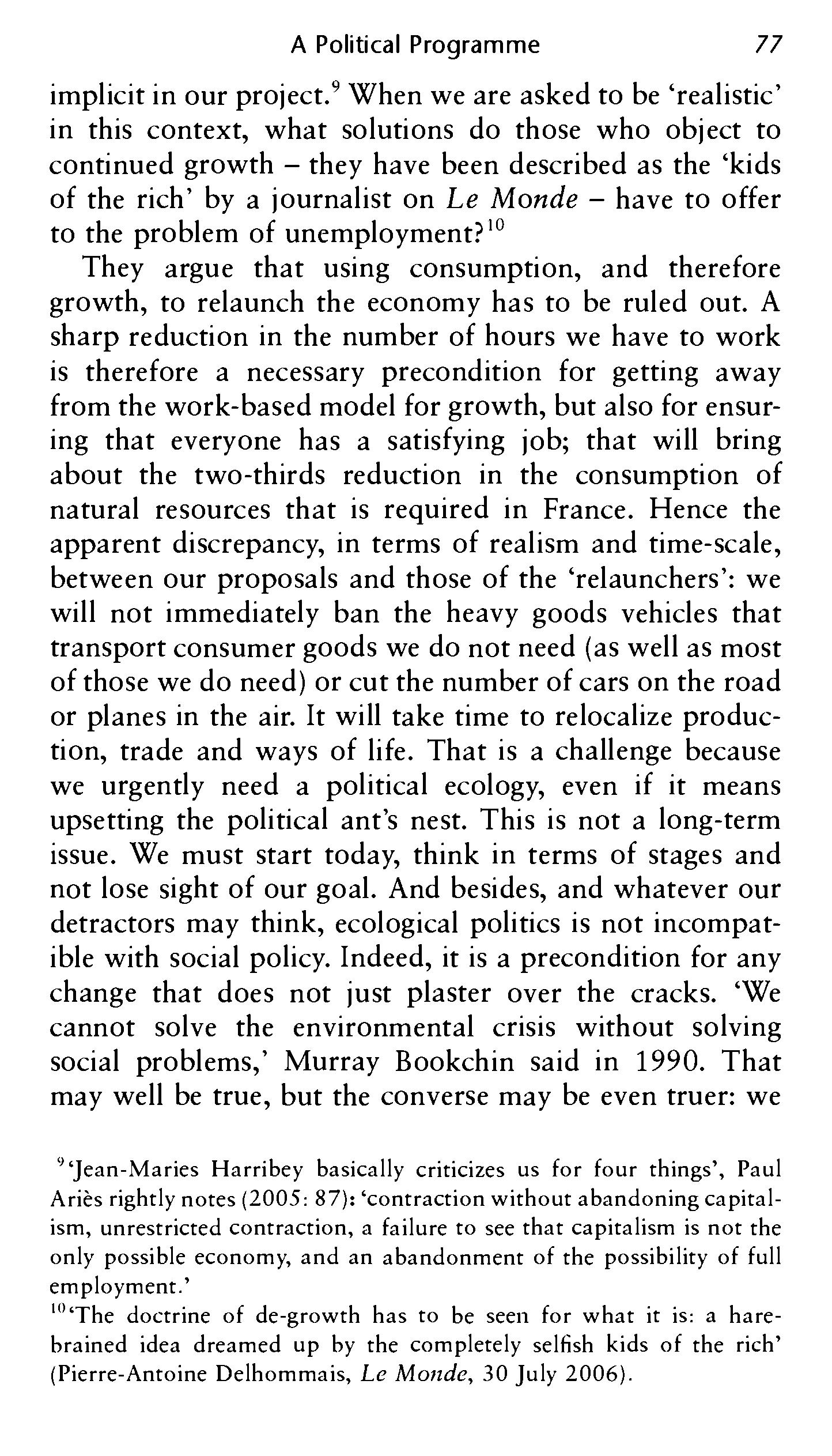
°'Jean-Maries Harribey basically criticizes us for four things', Paul Ariès rightly flotes (2005: 87): 'contraction without abandoning capital- ism, unrestricted contraction, a failure to see that capitalism is not the only possible economy, and an abandonment of the possibility of full employment.' '°'The doctrine of de-growth has to be seen for what it is: a hare- brained idea dreamed up by the completely selfish kids of the rich' (Pierre-Antoine Delhommais, Le Mo,zde, 30 July 2006).
78
A Political Programme cannot resolve social problems without resolving the envi- ronmental crisis.
When it comes to jobs, some opponents of growth refer to 'our ancestors who, in order to survive, worked hard and were reduced to drudgery'. They even think that, far from creating unemployment, de-growth will require us to work longer hours and will create a job surplus (Cheynet and Cheynet 2004)." An end to productivism and the exploitation of workers in the South would generate more work in order to satisfy the equivalent level of final con- sumption (which could be achieved be greatly reducing intermediate consumption).12 According to a study from the organic Fédération nationale des agriculteurs, 90,000 jobs could be created in France if the number of organic farmers rose from today's wretched 2% to Austria's 9%. If that figure rose to 15%, between 120,000 and 150,000 jobs could be created (Canfin 2006: 107). We will also have to create more jobs when the oil runs out. Fossil fuels (oil and natural gas) now provide 80% of the world's supply of primary energy. As a barrel of oil contains the energy equivalent of 25,000 hours of human labour (oi to be more accurate, 10,000 hours, given the efficiency of the engines that are best at converting fuel into mechanical labour), our daily consumption of hydrocarbons is equiva- lent to the work of over three hundred billion human
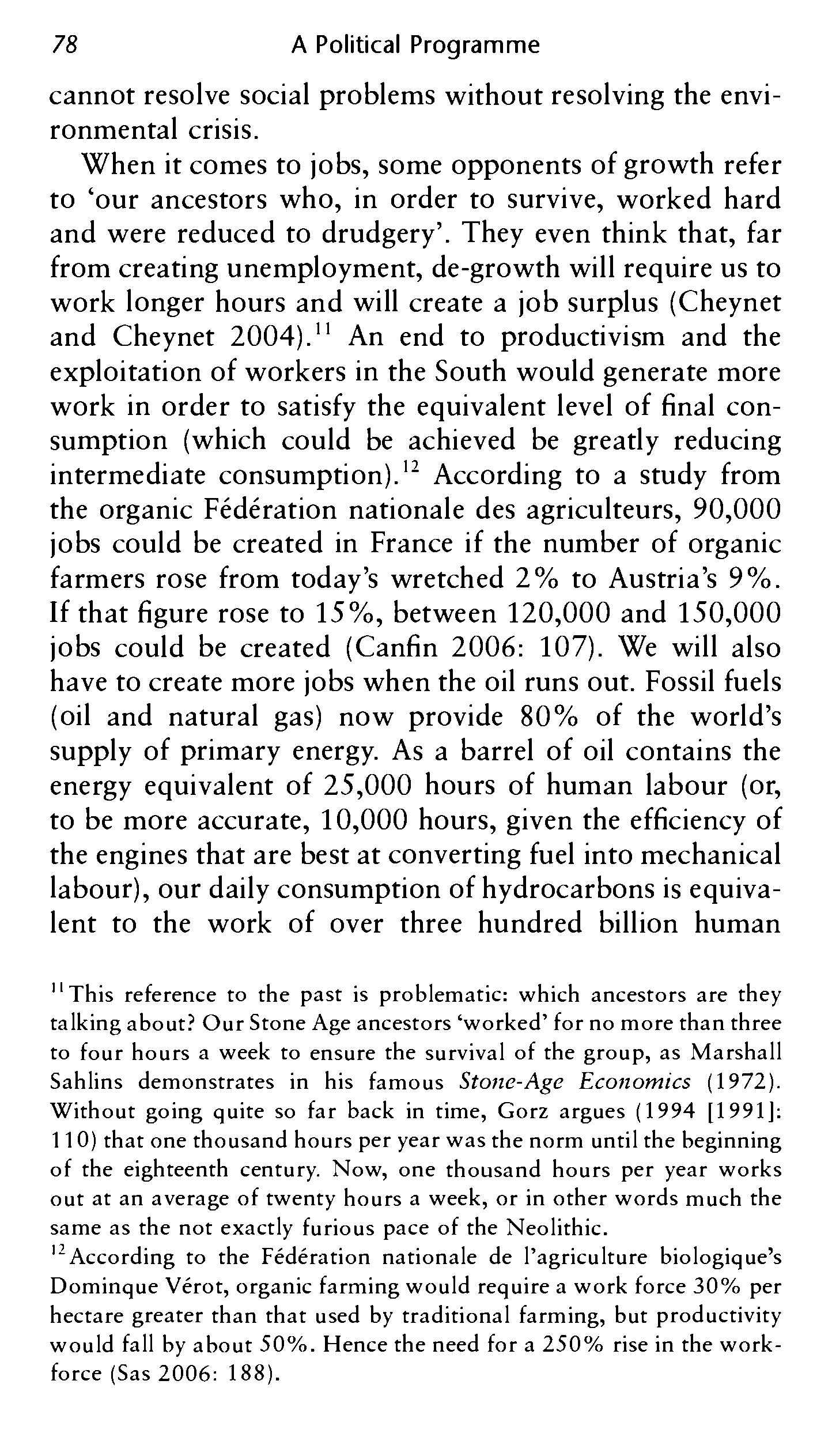
This reference to the past is problematic: which ancestors are they talking about? Our Stone Age ancestors 'worked' for no more than three to four hours a week to ensure the survival of the group, as Marshall Sahlins demonstrates in his famous Stone-Age Economics (1972). Without going quite so far back in time, Gorz argues (1994 [1991]: 110) that one thousand hours per year was the norm until the beginning of the eighteenth century. Now, one thousand hours per year works out at an average of twenty hours a week, or in other words much the same as the not exactly furious pace of the Neolithic. 2According to the Fédération nationale de l'agriculture biologique's Dominque Vérot, organic farming would require a work force 30% per hectare greater than that used by traditional farming, but productivity would fall by about 50%. Hence the need for a 250% rise in the work- force (Sas 2006: 188).
beings: 'It is as though everyone on earth had fifty slaves at their disposal' (Cochet 2005: 192, 139).'
If France applied the European directive and produced 20% of its electricity from renewable sources such as solar and wind power, 240,00 jobs could be created (Canfin 2006: 19). A document published by the European Com- mission in 2005 shows that every one million euros invested in energy efficiency creates 16 full-time jobs, as opposed to the 4.5 created by a nuclear power Station and the 4.1 created by a coal-fired plant. In other words, it costs twice as much to produce one kilowatt-hour as it does to save
it.
We have, therefore, four factors with different effects: (1) the undeniable loss of productivity that would result from the abandoning of the thermo-industrial model, polluting technologies and energy-greedy plant; (2) the relocalization of activities and a halt to the exploitation of the South; (3) the creation of green jobs in new sectors of activity; and (4) a change in our way of life and the removal of useless needs (major cutbacks in advertising, tourism, transport, the car industry, agribusiness, biotech- nologies, etc.). The first three have the effect of increasing the quantity of labour, whilst the fourth has the opposite effect. The 'reserve supply' is so great that the needs of a convivial art de vivre for all could be met by a considerable reduction in the number of hours we have to work. For centuries, productivity gains have been systematically transformed into greater output rather than into reducing the effort required. It should also be recalled that produc- tivity gains from technological innovations are systemati- cally over-stated because their less visible costs are not taken into account. At the same time, the potential
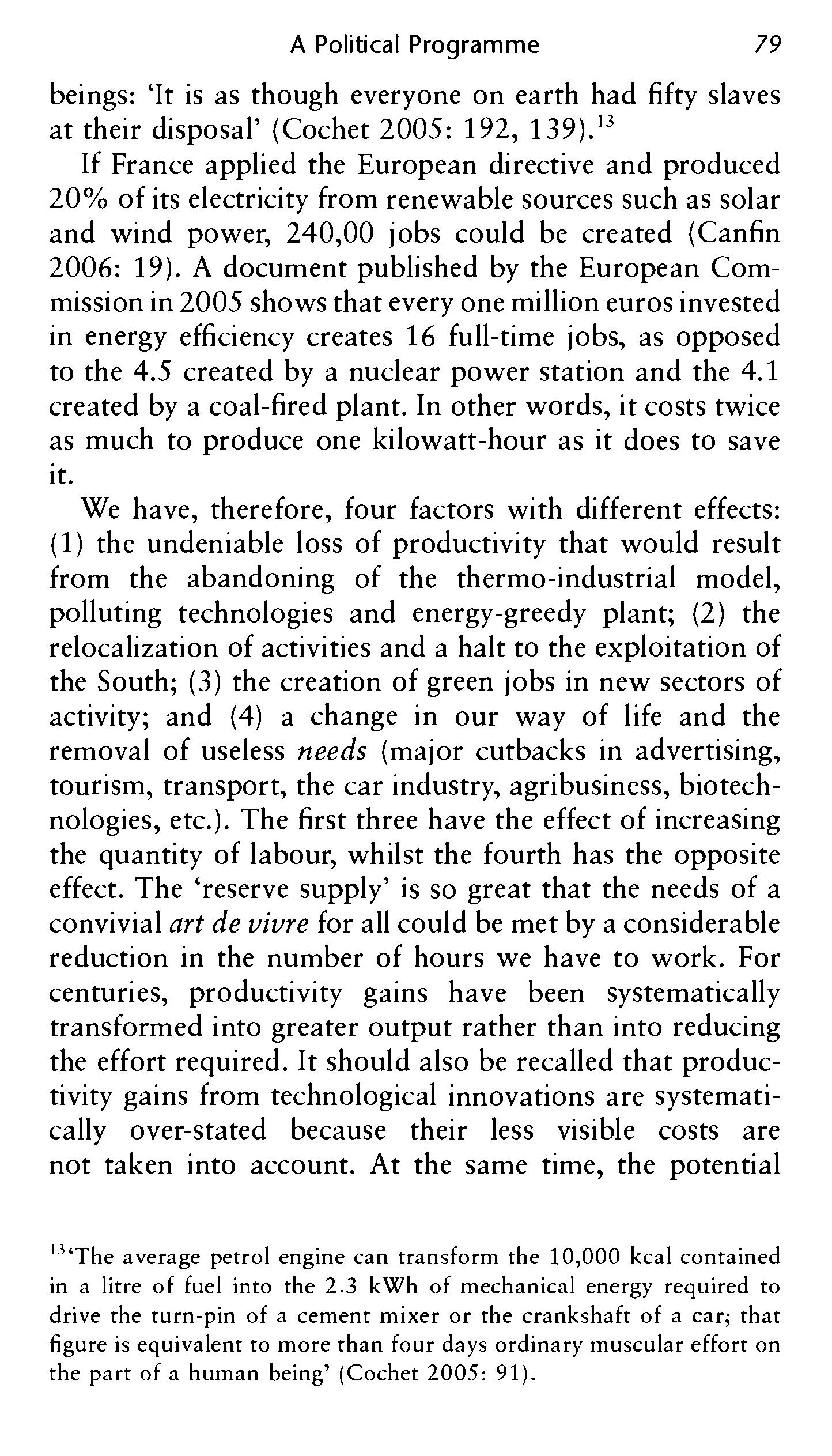
''The average petrol engine can transform the 10,000 kcal contained in a litre of fuel into the 2.3 kwh of mechanical energy required to drive the turn-pin of a cement mixer or the crankshaft of a car; that figure is equivalent to more than four days ordinary muscular effort on the part of a human being' (Cochet 2005: 91).
80
A Political Programme productivity gains from convivial tools are systematically under-stated.'4 It is reasonable to conclude that, after the sudden fall in overall productivity that would result from the abandonment of toxic technologies, we could expect modest but steady productivity gains, especially in terms of eco-efficiency. That would, at least in theory, allow a gentle transition. Different simulation models can of course be developed and discussed. A de-growth society could, at all events, provide productive waged work for all those who want it rather than, by more or less artificial means, transforming non-market activities into waged labour and increasing the number of parasitic or servile jobs.
It is also possible that, in its early stages, a de-growth policy would have the paradoxical effect, at the macroeco- nomic level, of increasing output by targeting both the demand for ecological products and appliances and the trades needed to produce them.
Lester Brown (2001) has demonstrated that nine pro- ductive sectors would have to be developed in a 'solar' economy, or in other words one based upon renewables: the construction of wind turbines, the production of photovoltaic cells, the bicycle industry, the production of hydrogen and the appropriate engines, building light railways, organic farming and reforestation. New trades must be developed at every level from forestry to eco-architecture.
The cuts, repairs and recycling that would result from the abandonment of built-in obsolescence will also give rise to new activities that would be very different from those proposed by the official anti-liberals of the tradi- tional left who want to build hospitals and schools in order to save jobs. I am not suggesting a general but unfocused relaunch of the economy. The main enemy is over- consumption or hyper-consumption, and not economic
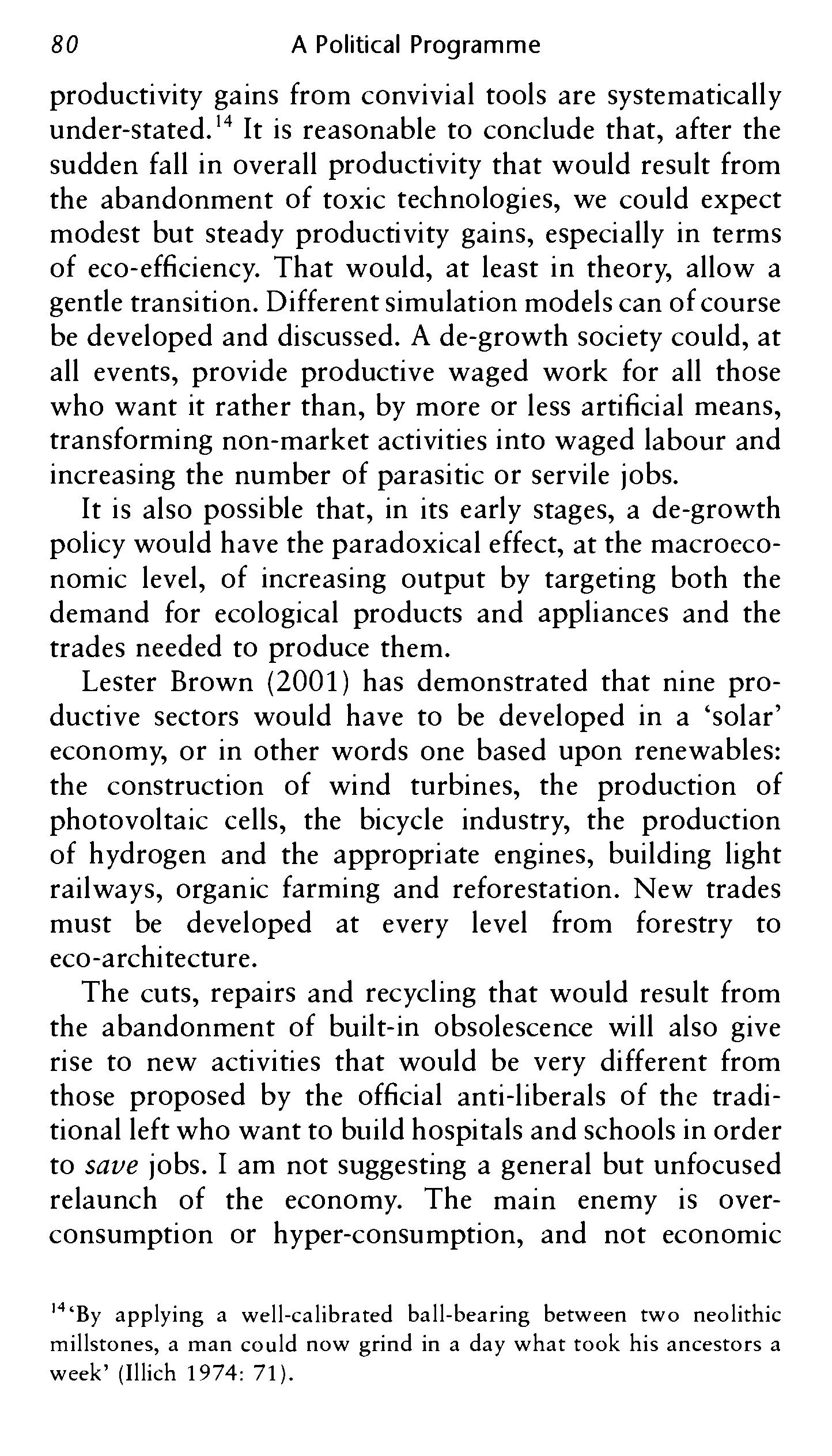
'4'By applying a well-calibrated ball-bearing between two neolithic millstones, a man could now grind in a day what took his ancestors a week' (Illich 1974: 71).
contraction. Dc-growth is not a rigid dogma but it does challenge the logic of growth for growth's sake. As well as reducing working hours and the number of harmful activities, the expansion of new and desirable activities could therefore have a positive outcome in terms of jobs.
It is difficult to predict how long the transition will take, but productivity gains could be translated into cuts in working hours and job creation without any detrimental effects on wages (or at least the lowest wages) or final output, though its content would have to be transformed. The transition can be painless, but the important thing is that there must be no compromise as to its objectives. If we change our lives, we can solve the problem of unem- ployment, but if we focus on the problem of jobs for the sake of jobs there is a danger that we will never change society and that we will head straight for disaster.
De-Growth: Beyond the Work-Based Society
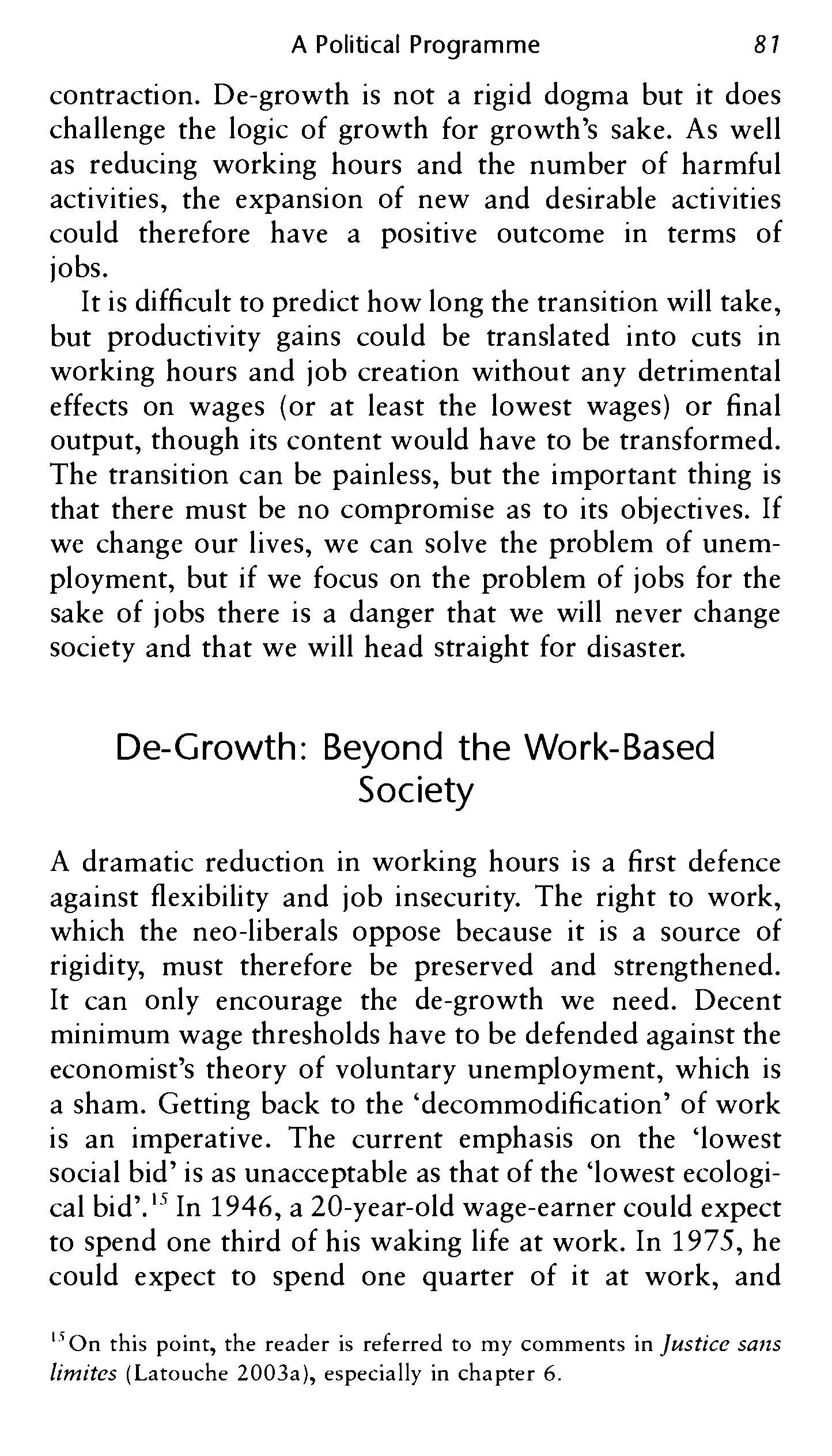
A dramatic reduction in working hours is a first defence against flexibility and job insecurity. The right to work, which the neo-liberals oppose because it is a source of rigidity, must therefore be preserved and strengthened. It can only encourage the dc-growth we need. Decent minimum wage thresholds have to be defended against the economist's theory of voluntary unemployment, which is a sham. Getting back to the 'decommodification' of work is an imperative. The current emphasis on the 'lowest social bid' is as unacceptable as that of the 'lowest ecologi- cal bid'.'5 In 1946, a 20-year-old wage-earner could expect to spend one third of his waking life at work. In 1975, he could expect to spend one quarter of it at work, and
'SOn this point, the reader is referred to my comments in Justice saizs limites (Latouche 2003a), especially in chapter 6.
82
A Political Programme today's equivalent figure is one fifth. Does he therefore feel that he has been Set free from work? Probably less so than ever before. 'For wage-earners,' notes Bernard Maris (2006: 109), 'this is not the end of work, as the underlying reduction in the number of hours worked would appear to show, but work without end, job insecurity, isolation, stress, fear and the certainty that they will have to leave their workplace quite quickly.'
Reducing working hours and changing the content of work are therefore primarily social choices resulting from the cultural revolution brought about by de-growth. Giving citizens more unconstrained time in order to allow them to blossom in their political, private and artistic lives, and play or contemplation, is the precondition for developing a new form of wealth. 'Our talents will take the place in our hearts that needs have taken away; our artistic, poetic and scientific talents will multiply and put down roots day by day' (Tarde 1980 [1896]: 92).
The basic question is therefore not the precise number of hours we need to work, but work's role as a social 'value'. We have lost our bearings in recent years, and that has been of some concern to the professional politicians of the left. Some prophesy the end or metamorphosis of work (Gorz 1994 [1991]; Méda 1995; Rifkin 1995; Robin 1994), whilst others have revived the ideology of work in a surrealist fashion. The same uncertainty surrounds retire- ment age; whereas early retirement used to be in fashion, there is now a tendency to argue that we should work longer. Some argue that the RM117 must lead to a new Speenhamland, and both the left and the right are demand-
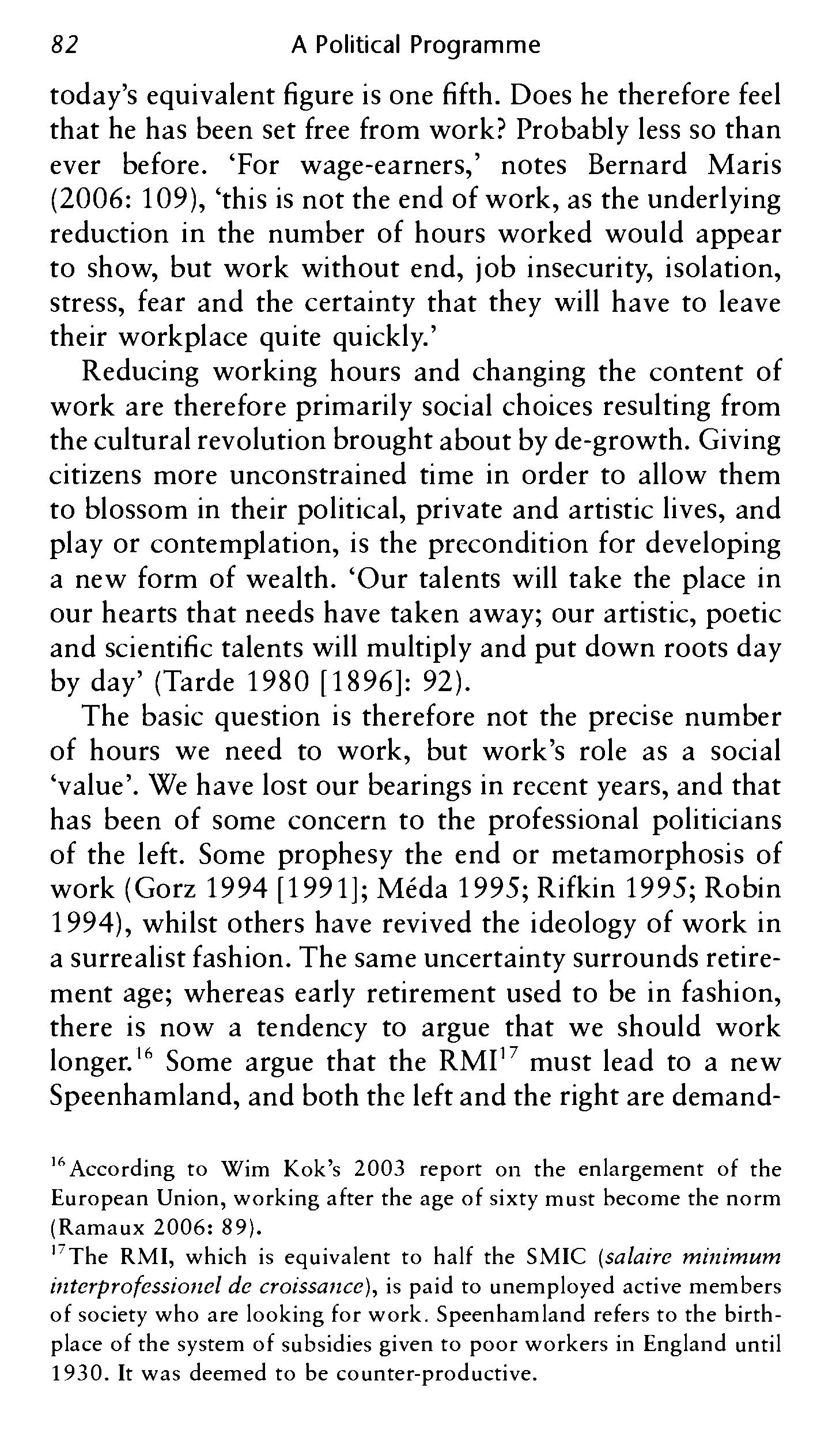
'6According to Wim Kok's 2003 report on the enlargement of the European Union, working after the age of sixty must become the norm (Ramaux 2006: 89).
The RMI, which is equivalent to half the SMIC (salaire minimum interprofessionel de croissance), is paid to unemployed active members of society who are looking for work. Speenhamland refers to the birth- place of the system of subsidies given to poor workers in England until 1930. It was deemed to be counter-productive.
ing a 'citizen income', whilst the 'thirty-five-hour week' has come under direct attack. French society, like all Western societies, is totally confused about the issue of work.
De-growth, in contrast, implies both a quantitative reduction in working hours and the qualitative transfor- mation of work. Certain individuals have already suc- ceeded in escaping from the growth society, and their experiences may show us a way forward, provided that we can resist the spiral of exponential accumulation and escape the infernal cycle of needs and income. This is the logic behind REPAS (Réseau d'échange des pratiques alter- natives et solidaires; see Barras 2002; Lulek 2003). Working less and in different ways may mean rediscover- ing a taste for leisure or recovering the lost abundance of the hunter-gatherer societies analysed by Marshall Sahlins (1972). Limiting one's own needs is one way of becoming an 'objector to growth'. Doing so realizes the objective preconditions for the changes at the social level that must be one of the goals of building a de-growth society. 'Changing life' (the Socialist slogan in 1981) or working 'towards a different world' (Attac's slogan in 2002) can be done today, but not with old recipes and not without making a break with the past. Possible compromises over how we make the transition must not make us lose sight of our objectives, which are not negotiable. The relative failure of the 'thirty-five-hour week' resulted from that lack of determination. Looking at the reasons for the failure of the German SPD's (Social Democratic Party) 1989 programme is just as instructive (Gorz 1994 [1991]: 28): it called for 'The reduction of weekly working hours to thirty spread over five days, to which would also be added the right to a sabbatical year and additional (paid) holidays for the parents of young children and those in need of care - i.e. an average working live of around a thousand years.' It further openly advocated de-growth: 'Those activities which threaten the natural foundations of life must diminish and disappear' (cited Gorz 1994 [1991]:
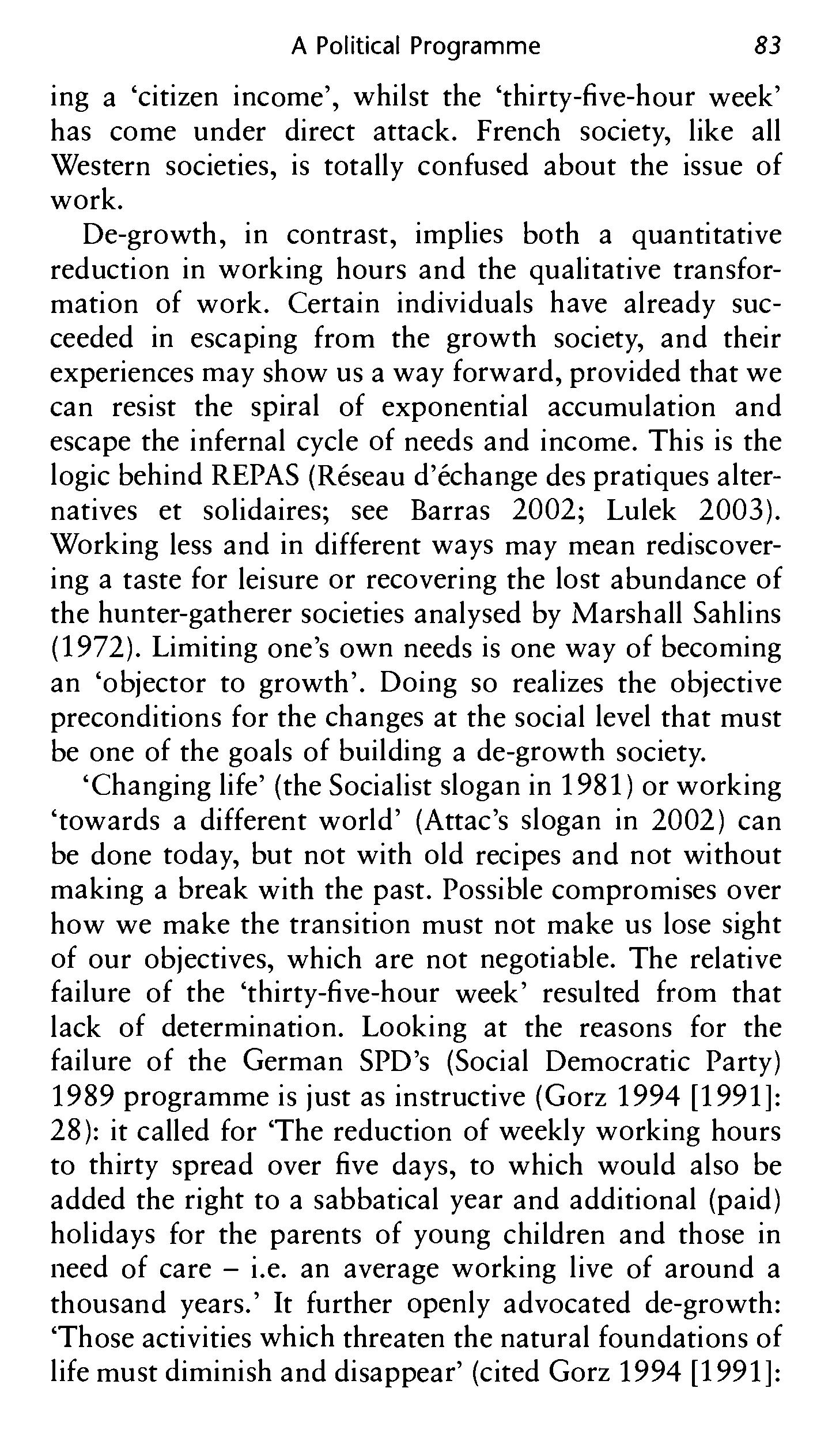
84
A Political Programme 32).18 Such activities include the nuclear industry and, to some extent, the use of private cars. The programme was based on the idea that ecological rationality and economic (capitalist) rationality could be reconciled by the famous win-win strategies (Gorz 1994 [1991]: 33): 'In the long term, what is ecologically unreasonable cannot be economically rational. . . Ecological necessities have to become the basic principles of economic activity. If we set about ecological modernization in time, we shall improve our chances of conquering tomorrow's markets and improve the competitiveness of our economy.' This reluc- tance to challenge the logic of capitalism probably explains the failure of the SPD (Gorz 1994 [1991]: 31):
It would be an illusion to believe - and paradoxical to hope - that ecological rationalization can compensate for the decline and conversion of the classical industries by employ- ing in an 'environmental economy' the labour and capital that are saved elsewhere. For a great many enterprises, ecological conversion can be an engine of growth during the transitional period, but this cannot be the goal from the macro-economic point of view. . . . This is a policy for which there is no alternative, and one which must not be presented as an option motivated by the economic oppor- tunities it affords.
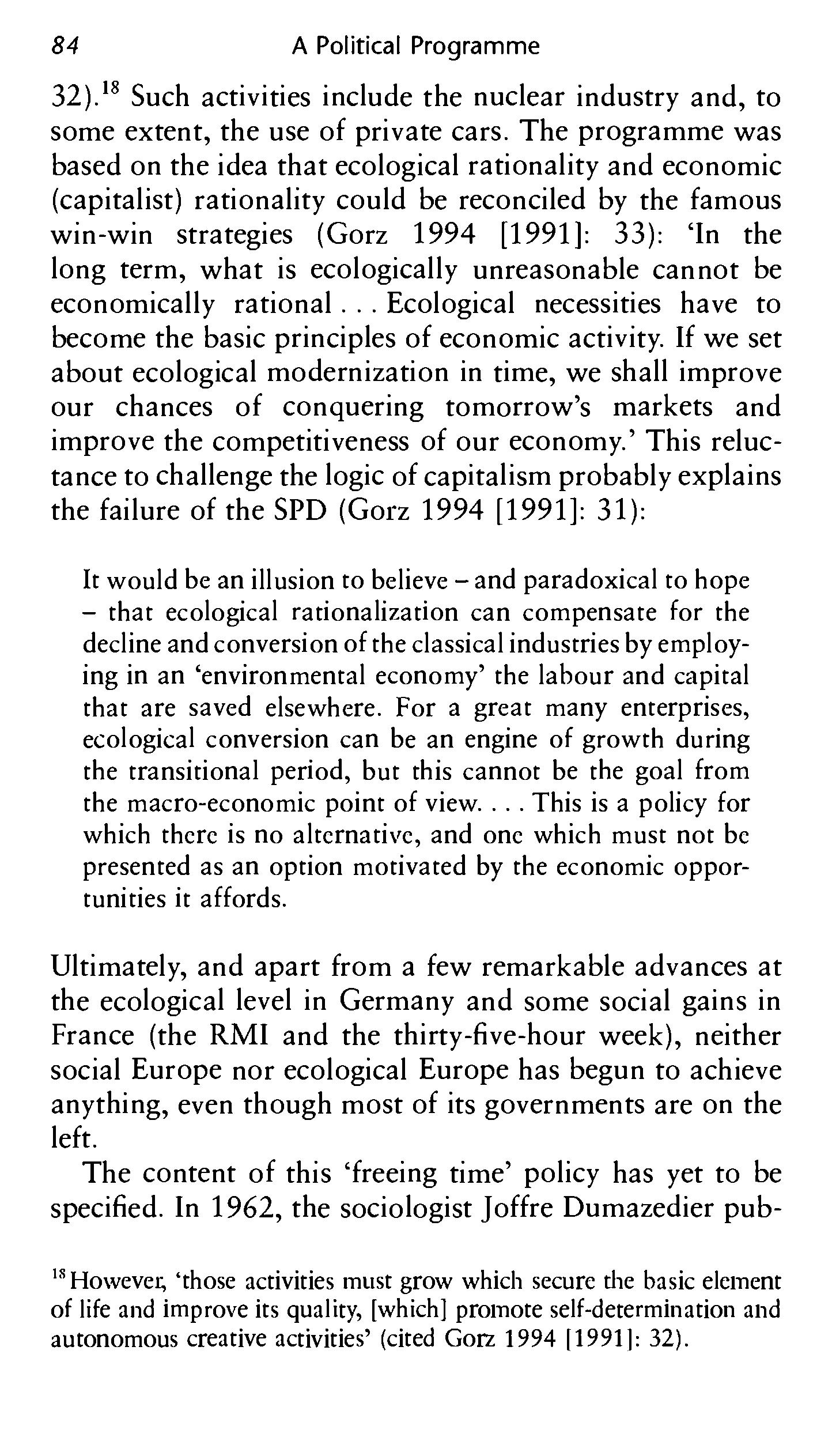
Ultimately, and apart from a few remarkable advances at the ecological level in Germany and some social gains in France (the RMI and the thirty-five-hour week), neither social Europe nor ecological Europe has begun to achieve anything, even though most of its governments are on the left.
The content of this 'freeing time' policy has yet to be specified. In 1962, the sociologist Joffre Dumazedier pub-
18ji 'those activities must grow which secure the basic element of life and improve its quality, [which] promote self-determination and autonomous creative activities' (cited Gorz 1994 119911: 32).
lished his pioneering study Towards a Society of Leisure (Dumazedier 1967 [1962]). In it, he examined in detail the three functions of leisure: relaxation, entertainment and (personal) development. His whole construct is based upon the hypothesis of an 'autonomous subject'. At about the same time, Henri Lefebvre was demonstrat- ing that: 'We no longer create ourselves through, by and with work.. . . In the guided bureaucratic consumer society. . . the meaning of life is a life devoid of meaning' (cited Paquot 2005: 29).
Unless life is 're-enchanted', the de-growth project, too, is doomed to failure. We still need to give liberated time a meaning. So long as waged work has not been trans- formed, the working classes will have no 'capacity for leisure', that is to say, 'the objective and subjective means for occupying the time freed up by autonomous activities' (Rainer Land, cited Gorz 1994 [19911: 58). As Daniel Mothé (1977) has demonstrated, under present condi- tions, time that has been liberated from work has not necessarily been liberated from the economy. Most of our free time does not lead to a reappropriation of life and does not represent an escape from the dominant market model. Time is still often devoted to activities that have been commodified, and those activities do not allow con- sumers to become the producers of their own lives. They are shunted on to a parallel track. Free time is becoming more and more professionalized and industrialized. Escap- ing the present productivist, work-based system presup- poses a very different form of organization in which leisure and play are as highly valued as work, and in which social relations take priority over the production and consump- tion of throwaway products that are useless or even harmful. 'Basically,' writes François Brune (2006), 'we are faced with the reconquest of personal time. A qualitative time. A time that cultivates slowness and contemplation because it has been set free from thinking about products.' To rephrase Hannah Arendt, it is not only that the two
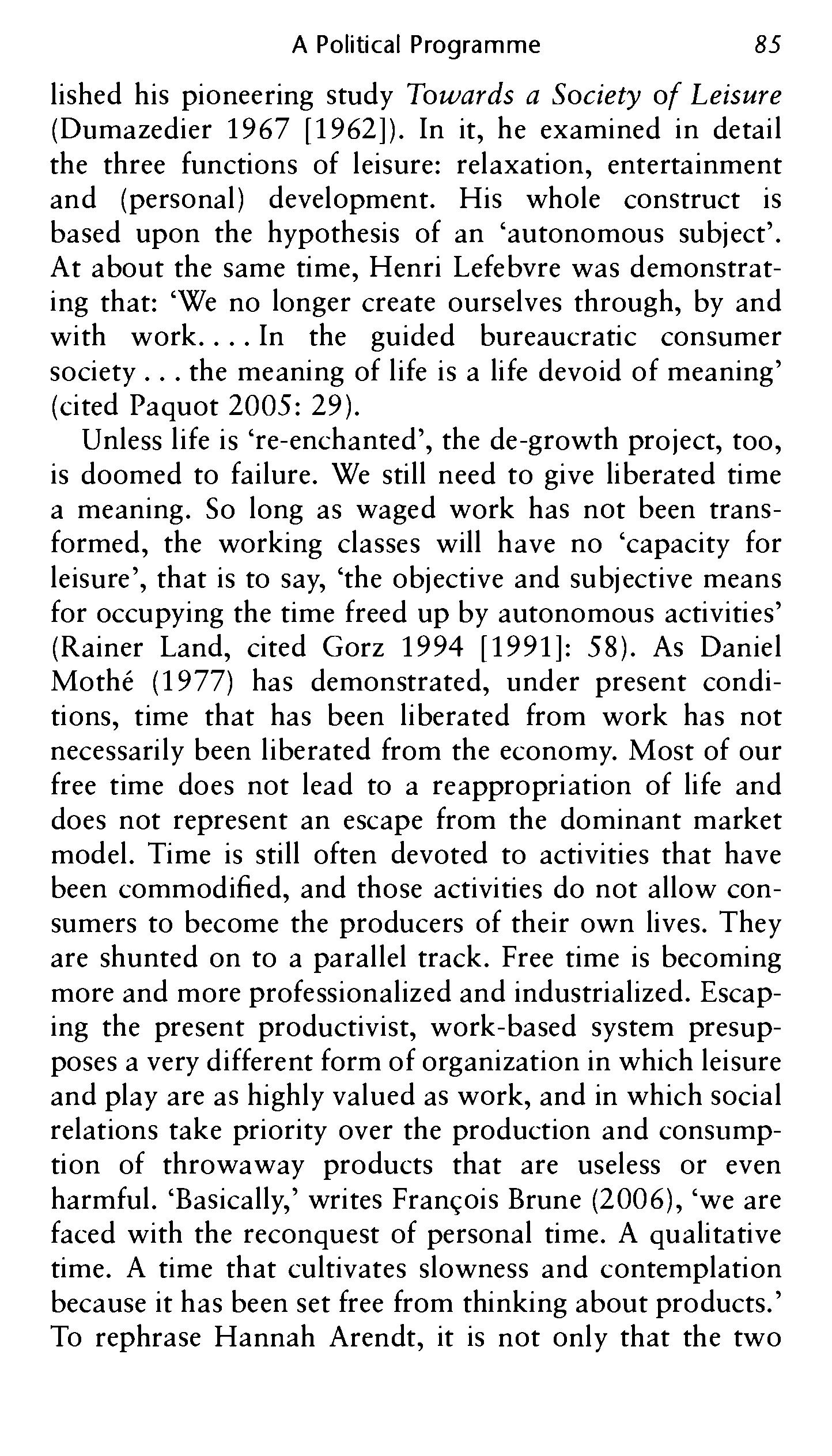
86
A Political Programme repressed components of the vita activa - the work of the artist or artisan and political activity in the true sense - will be restored to the same dignity as labour; the vita contemplativa itself will be rehabilitated. According to André Gorz (1994 [1991]: 61), we need 'a politics of time which embraces the reshaping of the urban and natural environment, cultural politics, education and training, and perhaps the social services and public amenities in such a way as to create more scope for self-managed activities, mutual aid, voluntary cooperation and production for one's own use'.
It is, perhaps, here that the difference between our 'sen- sibilities' and those of our critics is most obvious. Saving jobs at all cost, as recommended by Christophe Ramaux and, in more nuanced terms, Jean-Marie Harribey, is usually an expression, conscious or otherwise, of a visceral attachment to the work-based society. And the point is to
escape it, not to save it. Pro-work propaganda has been so successful that its victims have updated it by redefining 'real' work as a creative activity that can be likened to the 'labour' of giving birth, and thus breaking the historical link between work and the wage-system.'9 They even bemoan the fact that work has not extended its empire and its hold on life, and that house 'work' and charity work are not taken into account or remunerated.
Thanks to the alchemy of the market, the economy has often proved itself capable of creating more jobs and actu- ally increasing monetary values, but that has not led to increased satisfaction and may even have reduced satisfac- tion. Factoring in the cost of transport, packaging, adver- tising and branding can increase the price of a pharmaceutical molecule, yoghurt, water or any foodstuff but it does
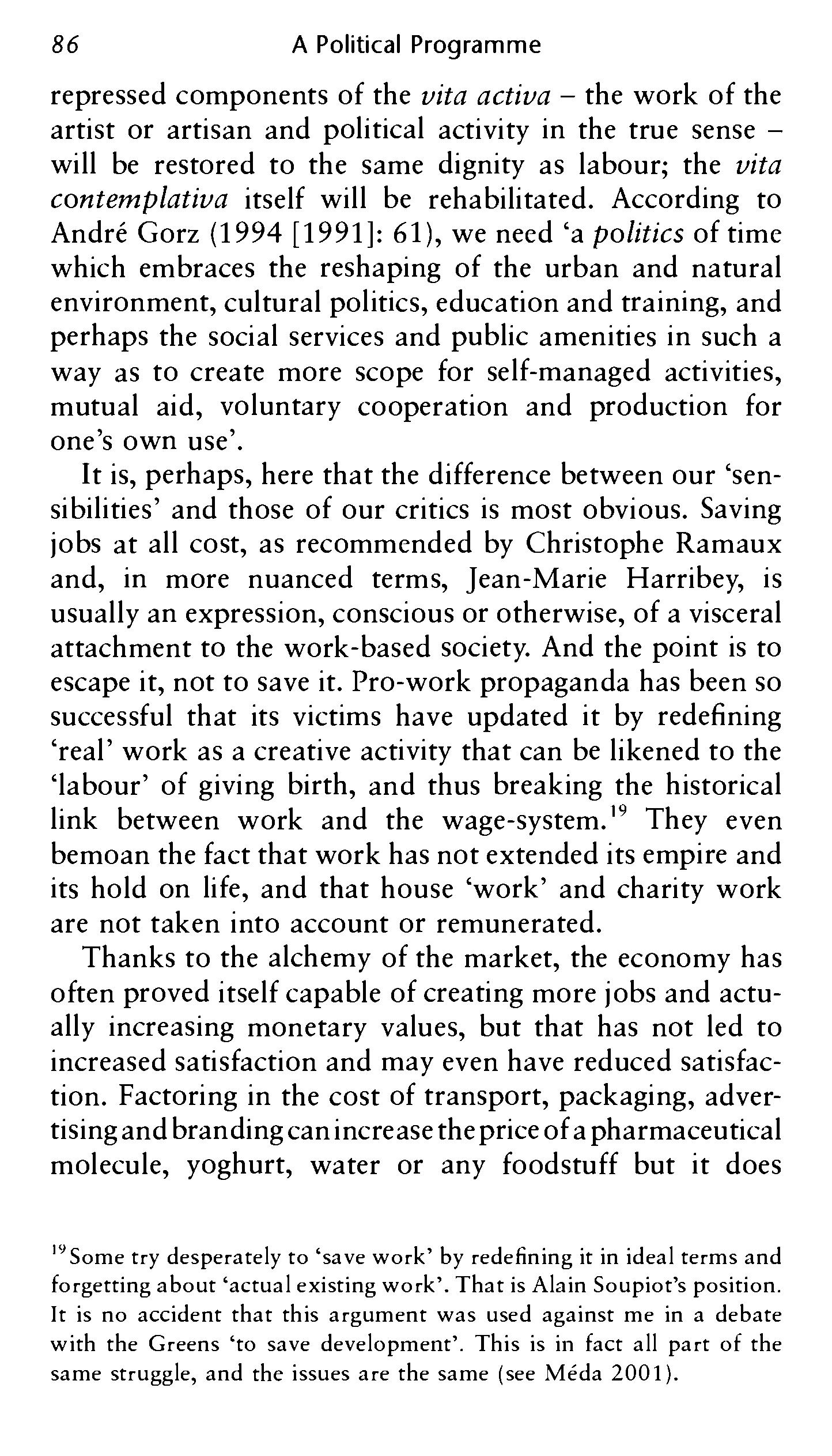
'9Some try desperately to 'save work' by redefining it in ideal terms and forgetting about 'actual existing work'. That is Alain Soupiot's position. It is no accident that this argument was used against me in a debate with the Greens 'to save development'. This is in fact all part of the same struggle, and the issues are the same (see Méda 2001).
nothing to increase their effectiveness.20 Yet this artificial increase in value consumes large quantities of energy (transport) and various raw materials (packaging, canning, advertising. . .), and any attempt to reduce growth has to prioritize the reduction of this intermediate consumption. The almost desperate attempts that are being made to increase market values still more on an exhausted planet (examples include fish farming, GM crops and nuclear energy) have had a truly catastrophic ecological impact. They certainly create jobs (which are often badly paid), but we could obtain the same ultimate satisfaction by drastically cutting the working week and greatly reducing our ecological footprint. 'By dint of monetizing, professionalizing and transform- ing into jobs the few remaining production and service activities we still perform for ourselves, might we not reduce our ability to look after ourselves almost to the point where it disappears, thus undermining the founda- tions of existential autonomy, not to mention the founda- tions of lived sociality and the fabric of human relationships?' asks André Gorz (1994 [1991]: 51-2). The various tricks that are used to convert activities into work on the pretext of saving jobs are very similar to those used to count the jobless and to remove them from the unemployment sta- tistics. 'There might,' Gorz adds (1994 [1991]: 47), 'be no limits to the development of employment if it were possible to transform into acts of paid work those activities which people have hitherto performed for themselves.' As he notes (1994 [19911: 50-1): 'In other words, from now on, job creation depends mainly not on economic activity, not
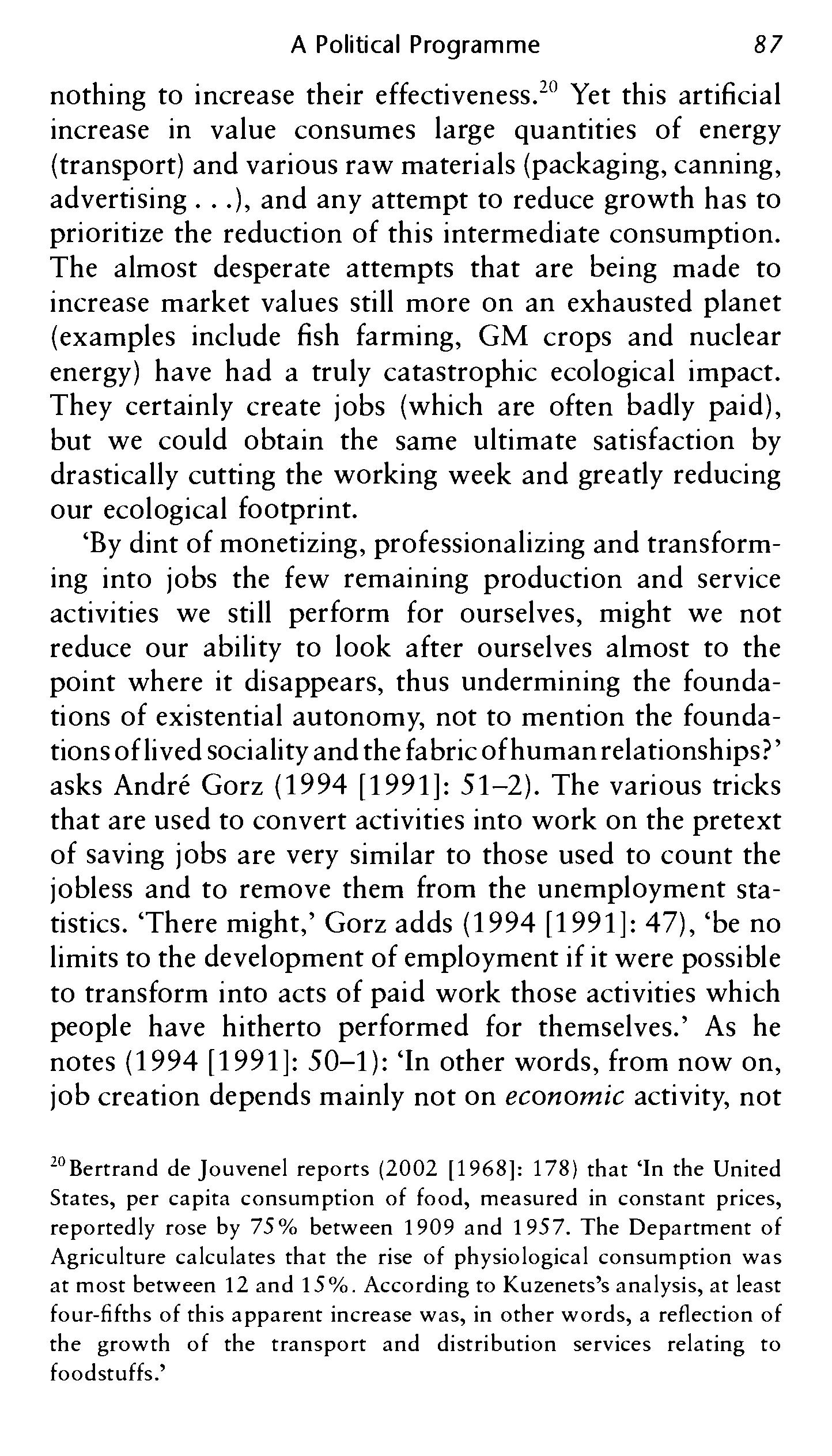
20Bertrand de Jouvenel reports (2002 [1968]: 178) that 'In the United States, per capita consumption of food, measured in constant prices, reportedly rose by 75% between 1909 and 1957. The Department of Agriculture calculates that the rise of physiological consumption was at most between 12 and 15%. According to Kuzenets's analysis, at least four-fifths of this apparent increase was, in other words, a reflection of the growth of the transport and distribution services relating to foodstuffs.'
88
A Political Programme on the productive substitution of waged work for individu- als' private production but on its counter-productive sub- stitution.' It creates, in other words, a new servant class or a new serfdom. Hence the ambiguity of all the 'personal services' we keep hearing about.
Conversely, rediscovering quality outside the logic of the market reduces economic values. This becomes quite obvious if production ceases to be dominated by the market: we both reduce our ecological footprint and GDP and at the same time increase a certain form of personal satisfaction. That is why the demand of some anti- globalization campaigners (create more service sector jobs to cut unemployment) is a bad good idea.2'
Gaining more 'free' time is an essential precondition for the decolonization of the economy. It concerns workers and wage-earners, but also stressed middle managers, bosses who are harassed by the competition and members of the liberal professions who are caught in the vice of compulsive growth. Far from being our adversaries, they can become our allies as we build a de-growth society.
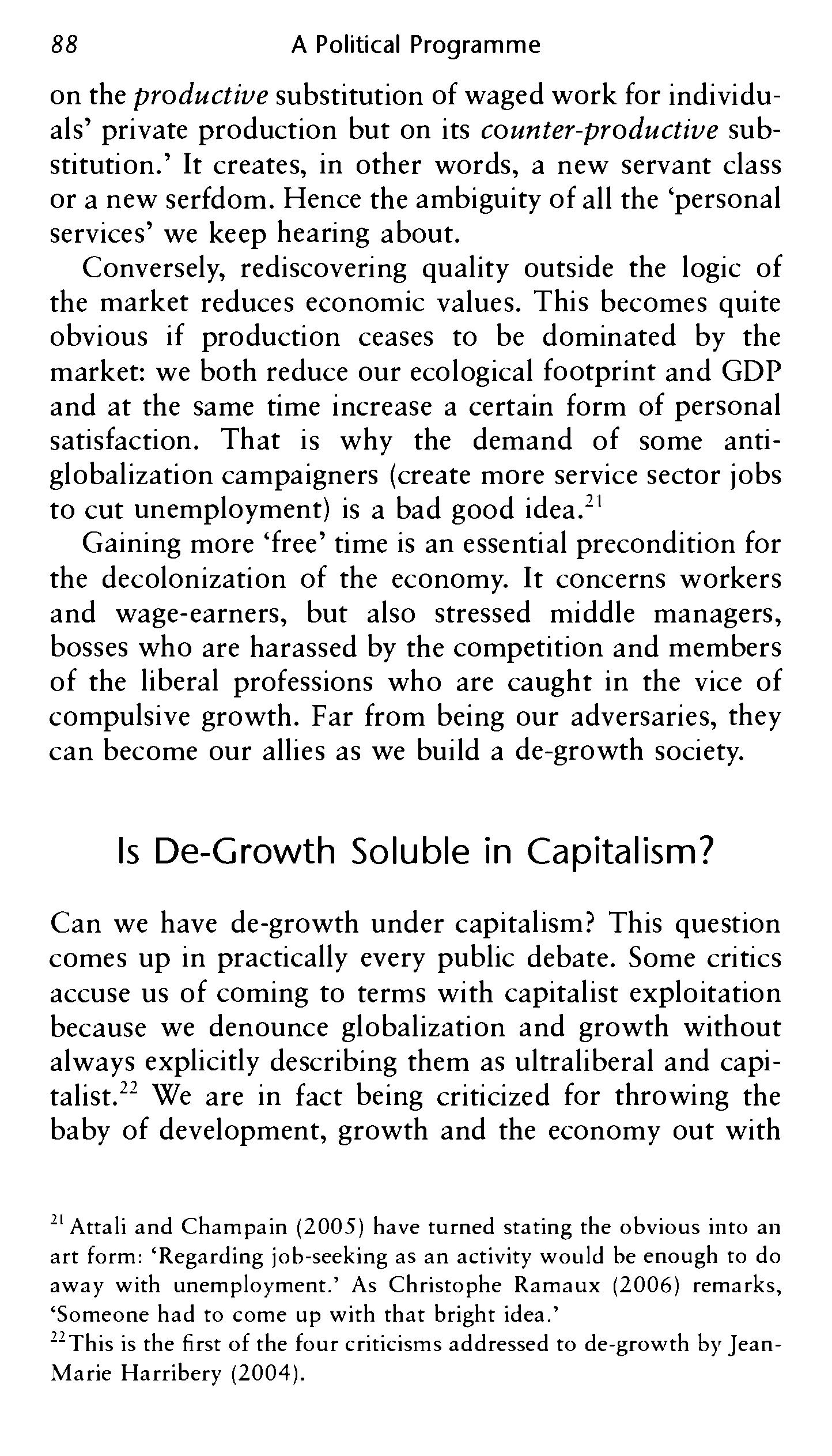
Is De-Growth Soluble ¡n Capitalism?
Can we have de-growth under capitalism? This question comes up in practically every public debate. Some critics accuse us of coming to terms with capitalist exploitation because we denounce globalization and growth without always explicitly describing them as ultraliberal and capi- talist.22 We are in fact being criticized for throwing the baby of development, growth and the economy out with
21 Attali and Champain (2005) have turned stating the obvious into an art form: 'Regarding job-seeking as an activity would he enough to do away with unemployment.' As Christophe Ramaux (2006) remarks, 'Someone had to come up with that bright idea.' 22This is the first of the four criticisms addressed to de-growth by Jean- Marie Harribery (2004).
the dirty water of capitalism and neo-!iberalism. We refuse, in other words, to 'save' the fantasy of an alternative economy, an alternative growth and an alternative devel- opment (which can variously be described as Keynesian, public, socialist, human, sustainable, clean . . .).
The traditional response from a certain section of the left consists in seeing the entity known as 'capitalism' as the source of all problems and all our powerlessness and, therefore, defining it as the citadel we have to demolish. Giving the enemy a face is in fact now problematic, as economic entities, like the transnational firms that actually hold powei are, by their very nature, incapable of exerting their power directly. On the one hand, Big Brother is anonymous; on the other, the servitude of his subjects is more voluntary than ever because their manipulation of commercial advertising is infinitely more insidious than that of political propaganda. How, under these conditions, can we 'politically' challenge the megamachine?
We do not dwell on a specific critique of capitalism because it seems to us that there is no point in stating the obvious. That critique was, for the most part, put forward by Karl Marx. And yet a critique of capitalism is not enough: we also need a critique of any growth society. And that is precisely what Marx fails to provide. A critique of the growth society implies a critique of capitalism, but the converse is not necessarily true. Capitalism, neo-liberal or otherwise, and productivist socialism are both variants on the same project for a growth society based upon the development of the productive forces, which will suppos- edly facilitate humanity's march in the direction of progress.
Because it cannot integrate ecological constraints, the Marxist critique of modernity remains terribly ambiguous. The capitalist economy is criticized and denounced, but the growth of the forces it unleashes is described as 'pro- ductive' (even though they are as destructive as they are productive). Ultimately, growth, seen in terms of the pro- duction/jobs/consumption trio, is credited with every, or
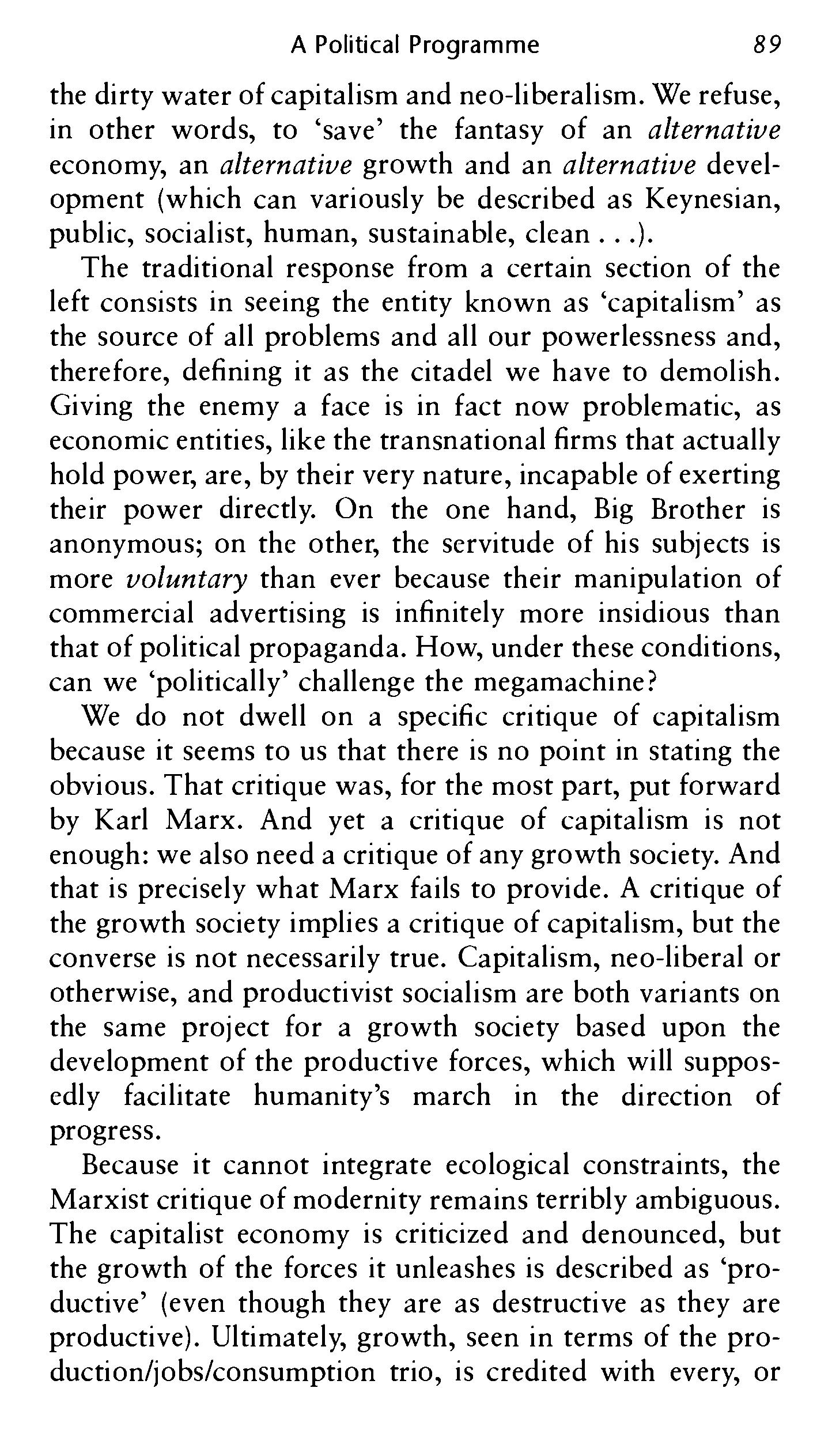
90
A Political Programme almost every, virtue, even though, when seen in terms of the accumulation of capital, it is held responsible for every scourge: the proletarianization of workers, their exploita- tion and impoverishment, not to mention imperialism, wars, crises (including, of course, ecological crises), and so on. Changing the relations of production (and this is what the revolution we both need and want means) is therefore reduced to meaning a more or less violent revolution in the status of those who have a right to a share in the fruits of growth. We can quibble about its content, but the prin- ciple remains unchallenged.
Given that the growth and development in question mean, respectively, the growth of the accumulation of capital and the development of capitalism, dc-growth can only mean the contraction of accumulation, capitalism, exploitation and predation. The point is not just to slow accumulation down but to challenge the concept of accumulation itself so as to reverse the destructive process. 23
We obviously cannot expect the non-Marxist left to raise this problem, as it came to an understanding with the system long ago.
Our conception of the dc-growth society means neither an impossible return to the past nor a compromise with capitalism. It means going beyond modernity (thanks, if possible, to an orderly transition). 'Capitalism can no more be "persuaded" to limit growth than a human being can be "persuaded" to stop breathing' (Murray Bookchin,
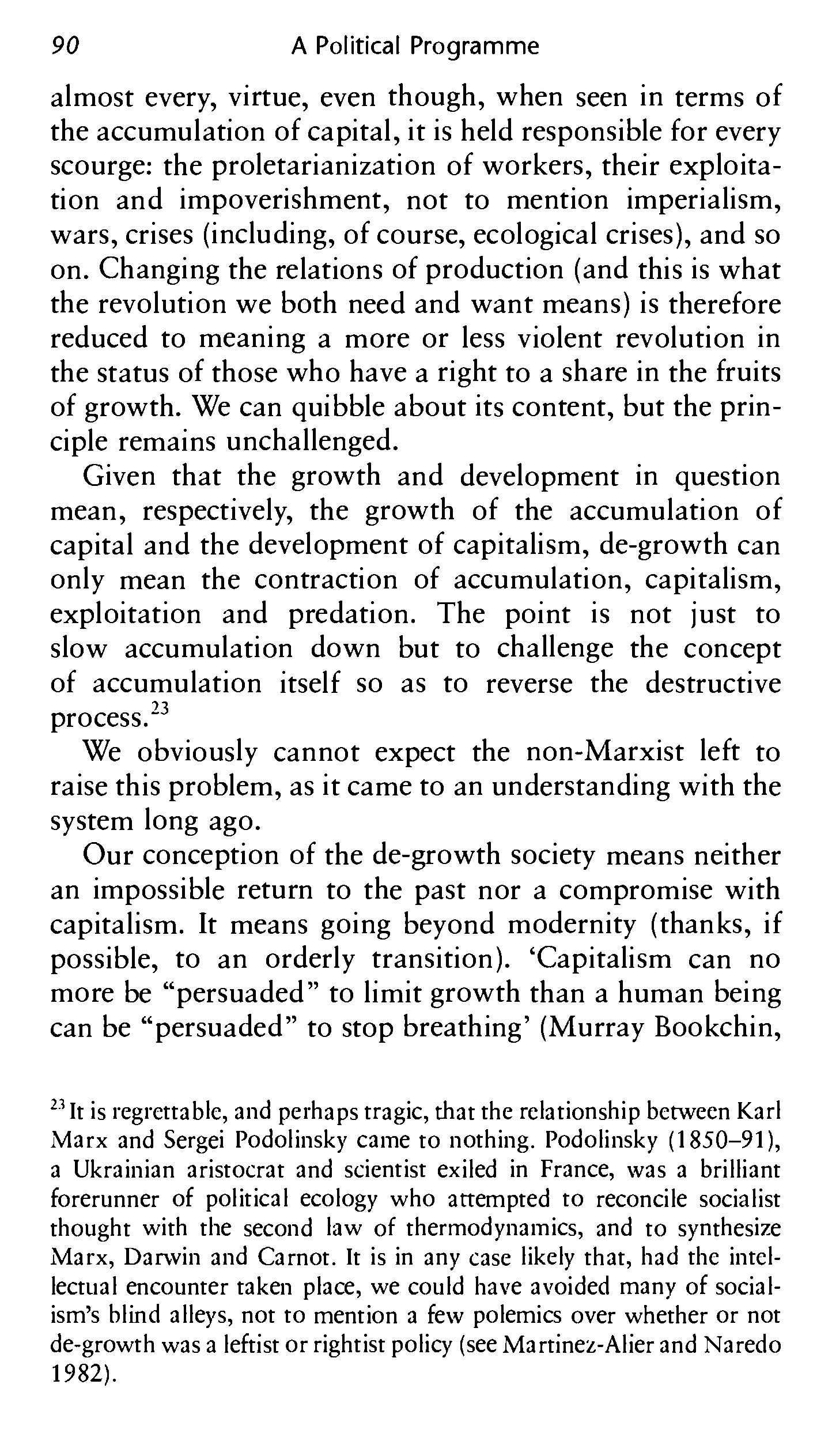
23 It is regrettable, and perhaps tragic, that the relationship between Karl Marx arid Sergei Podolinsky carne to iìothiiìg. Podolinsky (1850-91), a Ukrainian aristocrat and scientist exiled in France, was a brilliant forerunner of political ecology who attempted to reconcile socialist thought with the second law of thermodynamics, and to synthesize Marx, Darwin and Carnot. It is in any case likely that, had the intel- lectual encounter taken place, we could have avoided many of social- ism's blind alleys, not to mention a few polemics over whether or not de-growth was a leftist or rightist policy (see Martinez-Alier and Naredo 1982).
cited Martin 2006). De-growth is fundamentally anti- capitalist. Not so much because it denounces the contra- dictions and ecological and social limitations of capitalism as because it challenges its 'spirit', in the sense that Max Weber sees the 'spirit of capitalism' as a precondition for its existence. Whilst it is, in the abstract, possible to con- ceive of an economy that is ecologically compatible with the continued existence of a capitalism of the immaterial, that prospect is unrealistic when it comes to the imaginary foundations of a market society, namely excess and unbri- dled (pseudo-)domination. A generalized capitalism cannot but destroy the planet in the same way that it is destroying society and anything else that is collective. 'Beyond capitalism'. This is a convenient way of describ- ing a historical process that is anything but simple: elimi- nating capitalists, outlawing the private ownership of the means of production, and abolishing the wage relationship or doing away with money. Doing so would plunge society into chaos, and could not be done without using terror on a vast scale. And it would not be enough to abolish the capitalist imaginary. On the contrary.
Can we still talk of money, markets, profits and the wage system in a post-development society?24 These insti- tutions, which some are too quick to identify with capital- ism itself, are not necessarily obstacles in themselves. Many human societies are familiar with markets (espe- cially in Africa), currencies and commercial, financial and even industrial profits (though it would be more accurate to describe them as 'industrious', as we are talking about artisans). They are also familiar with paid labour that takes the form of what we call the wage system. And yet those 'economic' relations do not dominate either the pro- duction or circulation of 'goods and services'. What is more important, they are not so articulated as to form a system. They are neither market societies, wage-based
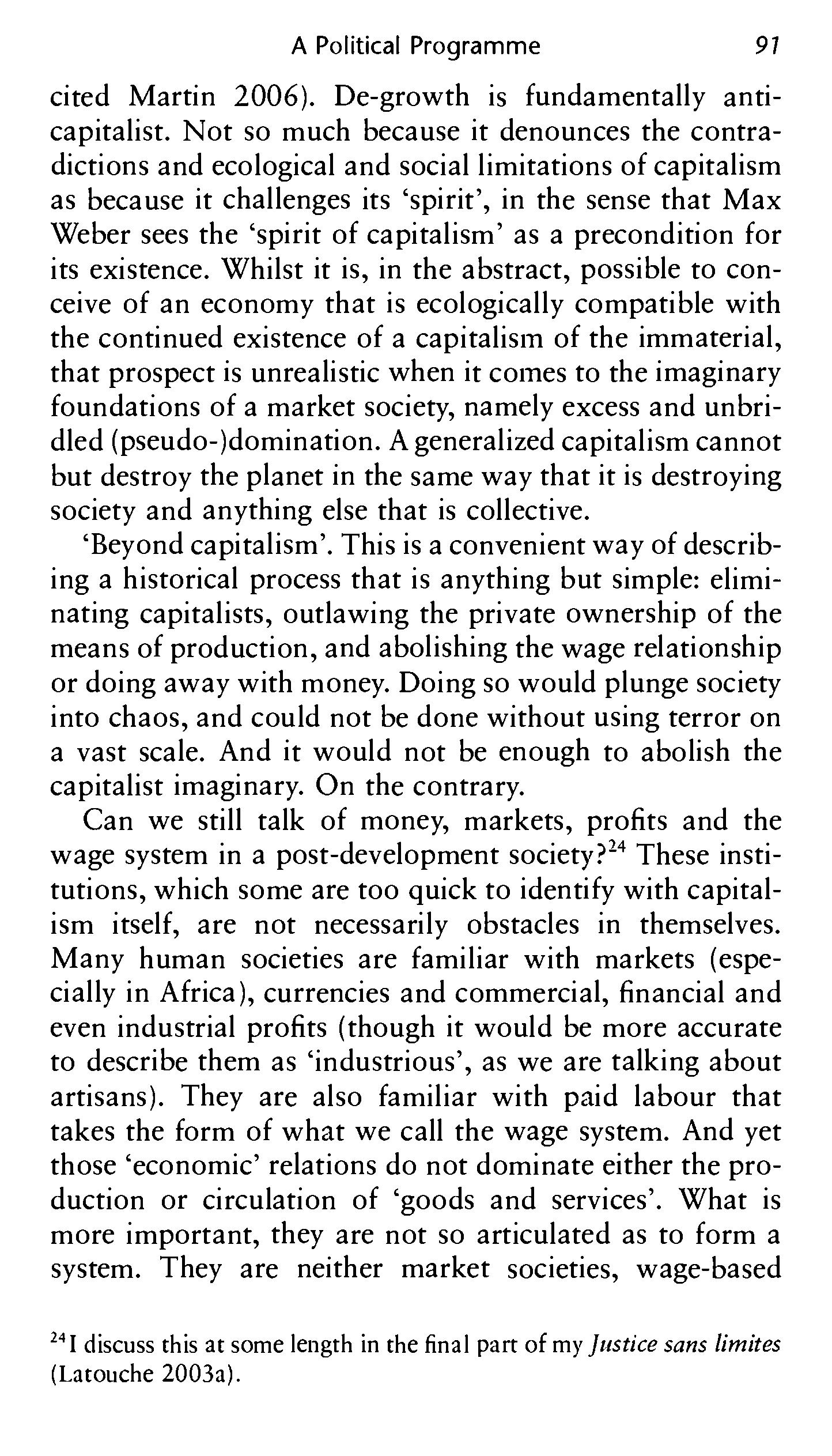
241 discuss this at some length in the final part of my Justice sans limites (Latouche 2003a).
92
A Political Programme societies nor industrial societies, and still less are they capitalist societies, even though both capital and ca pita!- ists can be found in them. The imaginary of these societies has been colonized by the economy to such a minor extent that they do not realize that they have an economy. Getting beyond development, the economy and growth therefore does not imply abandoning all the social institu- tions that the economy has annexed; it means embedding them in a different logic.25 De-growth can be regarded as en 'eco-socialism', especially if we agree with Gorz (1994 [1991]: 30) that socialism is 'the positive response to the disintegration of social bonds ensuing from the commodity and competitive relations characteristic of capitalism'.
Is De-Growth a Right-Wing Policy or a Left-Wing Policy?
The de-growth movement is revolutionary and anti- capitalist (and even anti-utilitarian) and its programme is basically political. But is it a left-wing policy or a right- wing policy? Many ecologists agree with Thierry Pacquot
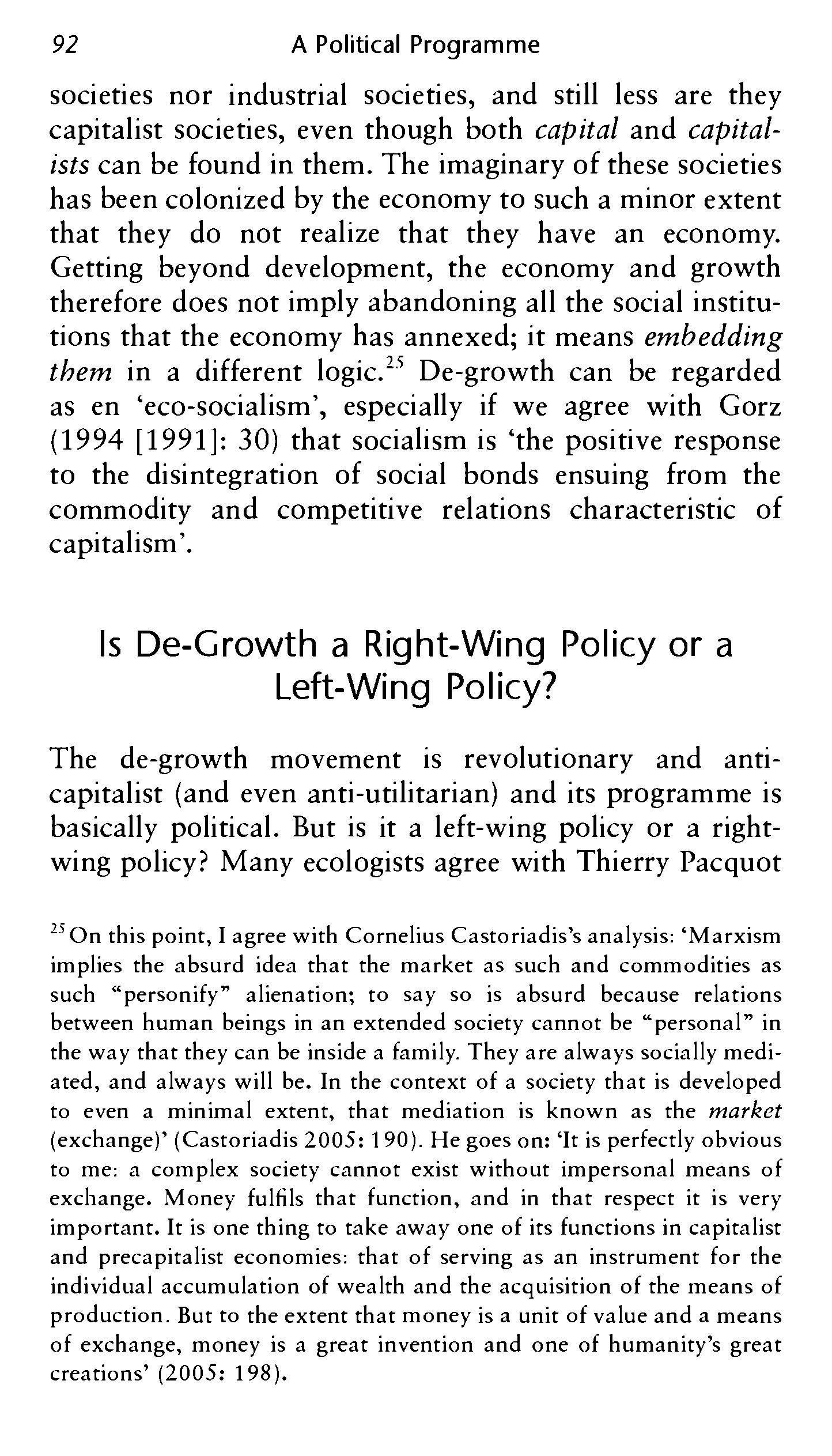
250n this point, I agree with Cornelius Castoriadis's analysis: 'Marxism implies the absurd idea that the market as such and commodities as such "personify" alienation; to say so is absurd because relations between human beings in an extended society cannot be "personal" in the way that they can be inside a family. They are always socially medi- ated, and always will be. In the context of a society that is developed to even a minimal extent, that mediation is known as the market (exchange)' (Castoriadis 2005: 190). He goes on: 'lt is perfectly obvious to me: a complex society cannot exist without impersonal means of exchange. Money fulfils that function, and in that respect it is very important. It is one thing to take away one of its functions in capitalist and precapitalist economies: that of serving as an instrument for the individual accumulation of wealth and the acquisition of the means of production. But to the extent that money is a unit of value and a means of exchange, money is a great invention and one of humanity's great creations' (2005: 198).
(2006: 113) that 'the real political duality is no longer that between "right" and "left", but that between those who care about ecology and the predators'. That is probably true, and it could be argued that the programme we are outlining - and it is primarily a matter of common sense - has as few supporters on the left as it does on the right. And yet those partisans who are not 'on the left' (Nicolas Hulot, Corinne Lepages, Yann Arthus-Bertrand) are often strangely Silent when it comes to the predators.
It is true that there is such a thing as a right-wing cri- tique of modernity, just as there is such a thing as a right- wing anti-utilitarianism and a right-wing anti-capitalism (although it is poorly represented in the parliamentary right). It is not surprising to find that right-wing critics of the ideology of work and anti-productivism use the same arguments as us. It has to be admitted that despite Paul Lafargue's fine The Right to be Lazy (Lafargue 1907) - Lafargue was Marx's son-in-law - which is still one of the harshest attacks on the ideology of work and productiv- ism, and despite the anarchist tradition within Marxism that was revived by the Frankfurt School, the workers' council movement and situationism, radical critiques of modernity are more highly developed on the right than on the left. Hannah Arendt and Cornelius Castoriadis did a lot to develop such critiques, which have also been influ- enced by the arguments of counter-revolutionary thinkers like Edmund Burke, Louis de Bonald or Joseph de Maistre, but they remain marginal in political terms. Maoism, Trotskyism and other forms of leftism are just as produc- tivist as the orthodox communisms.
There are, however, no grounds for confusing right- and left-wing anti-productivism, anti-capitalism or anti-utilitarianism.
Even though left-wing governments adopt right-wing policies and, because they do not dare to 'decolonize the imaginary', condemn themselves to social liberalism, those who object to growth and want to build a de-growth society that is convivial, peaceful and sustainable can tell

94
A Political Programme the difference (minimal as it may be) between Jospin and Chirac, Royal and Sarkozy, Schröder and Merkel, Prodi and Berlusconi, or even Blair and Thatcher. When they cast their votes (and we advise them to do so), they know that, even though no government programme takes into account the need to reduce our ecological footprint, they still have to look towards the values of sharing, solidarity, equality and fraternity rather than those of the freedom to do business (and to exploit). If, like Hans Jonas, we extend those values to future generations, we have to put an end to the pillaging of nature, if not the massacre of other species, and get away from a narrow anthropocentrism. That is why we have to be resolute in the fight against globalization and economic neo-liberalism.
A contrario, writes Hervé Kempf (2007: 114), 'the cunning of history seems to mean that authoritarian gov- ernments use ecological necessity as a way of justifying restrictions of freedom without doing anything about inequality. Managing epidemics, nuclear accidents, pollu- tion peaks and climate change could all be invoked as reasons for restricting our liberties.' We could easily move from the rampant totalitarianism of our current pluto- cratic oligarchy, which still preserves a semblance of formal democracy, to a muscular eco-fascism or eco-totalitarian- ism. André Gorz (1994 [1991]: 43-4) outlines how this could happen:
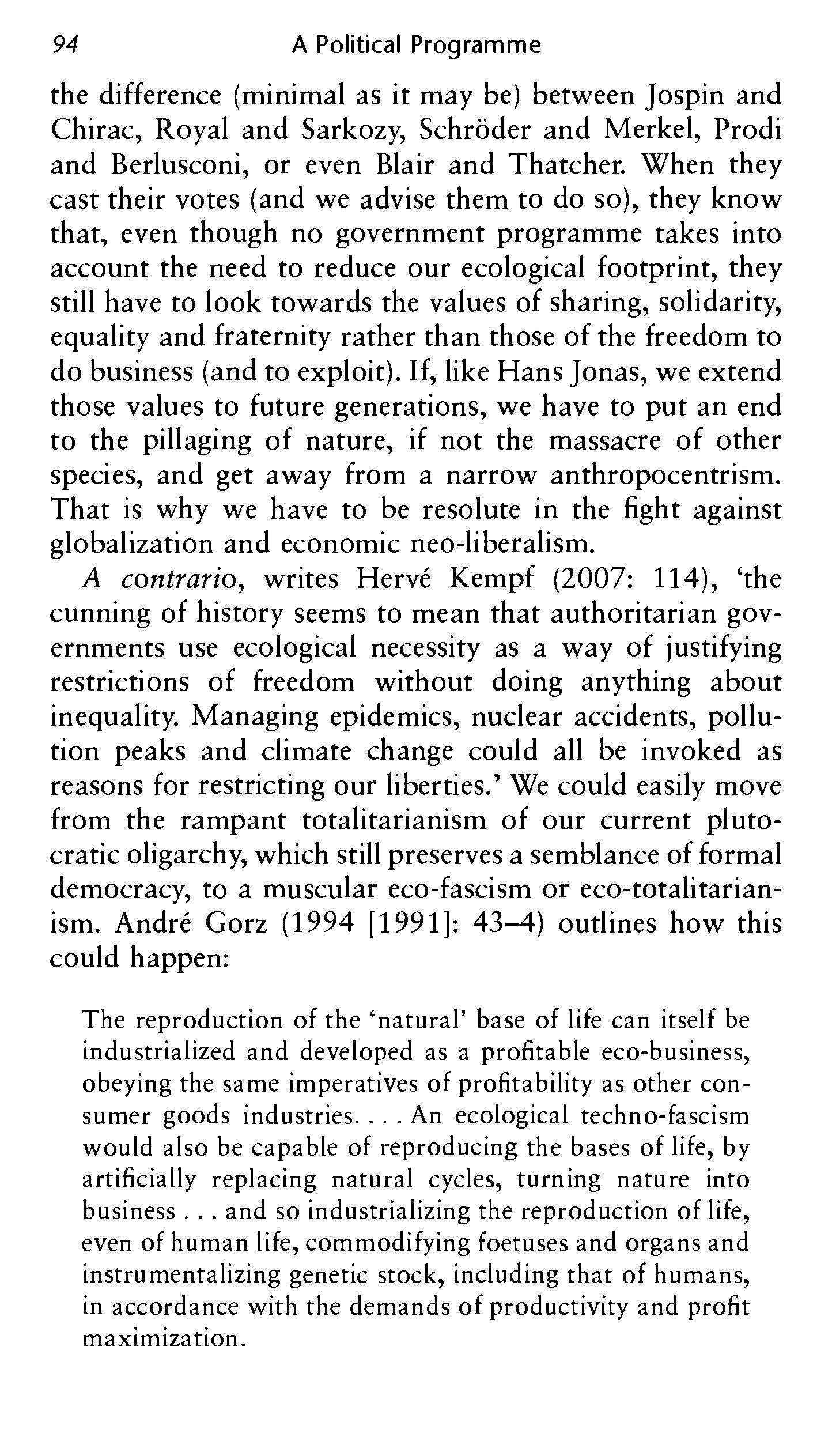
The reproduction of the 'natura!' base of !ife can itself be industrialized and developed as a profitab!e eco-business, obeying the same imperatives of profitability as other con- sumer goods industries. . . . An eco!ogical techno-fascism wou!d also be capab!e of reproducing the bases of !ife, by artiflcial!y replacing natura! cycles, turning nature into business . . . and so industrializing the reproduction of life, even of human life, commodifying foetuses and organs and instrumentalizing genetic stock, inc!uding that of humans, in accordance with the demands of productivity and profit maximization.






